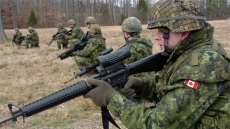TORONTO — Zika isn't the only mosquito-borne bug that poses a health risk to Canadians travelling to vacation hotspots, even though the virus is raising the most alarm due to a possible link with microcephaly in newborns whose mothers may have been infected during pregnancy.
Dengue, chikungunya and yellow fever can also be harboured by the Zika-carrying Aedes mosquitoes that are endemic in Central and South America, many Caribbean countries, Mexico and parts of the southern U.S.
Dengue — also known by the cringe-worthy descriptor "break-bone fever" — is caused by one of four related strains of the virus, which can be transmitted to a human through the bite of an infected mosquito.
Only about a quarter of those infected experience symptoms, but they can be nasty — high fever, severe headache and eye pain, joint and muscle and/or bone pain and a rash.
"From a global perspective, the burden of dengue is huge," said Dr. Mark Loeb, an infectious disease specialist at McMaster University in Hamilton. "It's been estimated relatively recently that there's about 400 million cases of dengue globally per year."
Up to about 500,000 of those cases are severe enough to require hospitalization, and the disease kills about 25,000 people each year, many of them children, he said.

That's because the virus can cause dengue hemorrhagic fever, a severe and potentially deadly disease that can occur when a person is infected with one strain of dengue, then subsequently exposed to a second strain.
A vaccine to protect against dengue has recently been developed, but in clinical trials it's been shown to be only about 60 per cent effective — the seasonal influenza vaccine has about the same efficacy — and has not yet been approved by regulators.
Loeb said dengue hemorrhagic fever, which can lead to fatal shock, is unlikely to be a concern for most Canadian vacationers because the chance of getting a secondary infection with another strain is unlikely.
"We know that travellers can get dengue, but they're very unlikely to get severe illness from dengue ... it's like having a very bad flu."
In recent years, chikungunya (pronounced chick-uhn-guhn-ya) has also become an issue for travellers to southern climes, particularly to countries in the Caribbean and Central America.
The majority of people infected with chikungunya develop some symptoms, most commonly fever and joint pain, although effects can include headache, muscle pain, joint swelling and rash. While most people feel better within about a week, symptoms can be severe and disabling.
"It is an unpleasant disease when you get it, but it's very, very rarely fatal," said Dr. Nick Ogden, a senior research scientist at the Public Health Agency of Canada's (PHAC) national microbiology lab in Winnipeg.
Yet in about 20 per cent of cases, those infected with chikungunya experience arthritis-like joint pain that can persist for months, or even years.

In December 2013, local transmission of the virus was reported for the first time in the Americas. The island of St. Martin was the first to log cases of chikungunya, which spread like wildfire to other locations in the Caribbean and beyond — including to the United States. As of July 2015, more than 1.5 million cases had been reported to the Pan American Health Organization.
In 2014, Canada recorded a spike in cases among residents who had returned from endemic regions. As of early December 2014, 320 confirmed and 159 probable cases had been diagnosed in Canada, PHAC says on its website.
"The difference between 2013 and 2014 was quite stark," said Ogden. "It was associated with its emergence in the Caribbean and Central America, places where Canadian travellers go."
There is no vaccine against chikungunya, although scientists are working to develop one.
Then there is yellow fever.
While the vast majority of cases and deaths from yellow fever occur in sub-Saharan Africa, the virus borne by the Aedes aegypti mosquito should also be of concern to people travelling to some South and Central American countries and several Caribbean islands, where the disease is either endemic or on the rise, says the World Health Organization.
"Although the disease usually causes only sporadic cases and small outbreaks, nearly all major urban centres in the American tropics have been re-infested with Aedes aegypti and most urban dwellers are vulnerable because of low immunization coverage. Latin America is now at greater risk of urban epidemics than at any time in the past 50 years," the WHO says on its website.
Yellow fever, which initially causes such symptoms as fever, headache and muscle aches, can in some people enter a potentially fatal toxic phase marked by yellowing of the skin and eyes, abdominal pain and vomiting, bleeding from the nose, mouth and eyes, liver and kidney failure, delirium, seizures and eventually coma.
There is no treatment for yellow fever, but it can be prevented with vaccination, which many endemic countries require travellers to obtain prior to their visit.
"I think that people should be aware of the risk of mosquito-borne diseases when they are travelling," said Ogden, who advises visiting PHAC's website "to know if you're travelling to a particular country where there are health risks and how to take appropriate precautions against them."
"Do you need to carry bed nets? Do you need to carry the appropriate mosquito repellent? Do you need a yellow fever vaccine?"
Loeb said that while no one wants to contract dengue, chikungunya or yellow fever, the risk of severe illness or death for Canadian travellers from those diseases pales with Zika's risk of possibly causing unusually small heads in children born to women infected while pregnant.

"Zika, if this holds true and the risk is substantial enough, one has to do the best one can to protect pregnant women from this sort of birth defect, because it's potentially a terrible thing," he said.
"Something like dengue, it can be a very bad case for a traveller, it can be like a very bad case of the flu. But you get over it.
"Microcephaly — that's for life."



